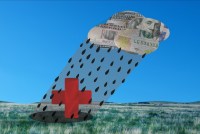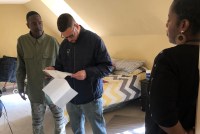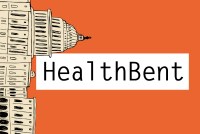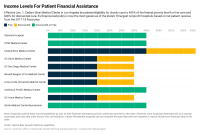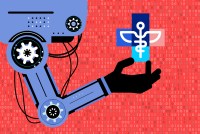Latest KFF Health News Stories
Homeless Californians Adapt To Camp Sweeps And ‘The Caltrans Shuffle’
Communities across California, frustrated with the growing number of homeless people living on public property, have tasked police and sanitation workers with dismantling encampments they say pose a risk to health and safety. The routine cleanups have spawned another public health concern: the loss of the displaced people’s personal possessions, including medicines.
Must-Reads Of The Week From Brianna Labuskes
Newsletter editor Brianna Labuskes wades through hundreds of health care policy stories each week, so you don’t have to.
High-Deductible Plans Jeopardize Financial Health Of Patients And Rural Hospitals
Small hospitals and patients in rural areas have been hit hard by the boom in high-deductible health plans. Often when a patient arrives at a rural hospital needing critical care, the person is stabilized and transferred to a larger facility. But bills from the first site of care generally get applied to the patient’s deductible. When patients can’t afford their deductible, the smaller hospital winds up eating the costs.
Family Doctors In Rural America Tackle Crisis Of Addiction And Pain
For rural physicians, the burden of responding to the opioid epidemic falls squarely on their already loaded shoulders. For one doctor in a small Wisconsin village, there was no question that she wanted to rise to the challenge.
KHN’s ‘What The Health?’: Democrats Roll Dice On SCOTUS And The ACA
A group of Democratic state attorneys general are betting the Supreme Court will take up the case and overturn a federal appeals court ruling in time for the 2020 elections. In other high-court news, most Republicans in Congress are asking the justices to use a Louisiana law to overturn the landmark abortion-rights ruling, Roe v. Wade. Joanne Kenen of Politico, Stephanie Armour of The Wall Street Journal and Paige Winfield Cunningham of The Washington Post join KHN’s Julie Rovner to discuss this and more. Rovner also interviews NPR’s Richard Harris, who wrote the latest KHN-NPR “Bill of the Month” feature.
‘An Arm And A Leg’: Watch Your Back — And Your Wallet
Cathryn Jakobson Ramin, author of the book “Crooked,” says chronic low back pain is not a medical condition. Nonetheless, that complaint sends millions of Americans down a path of expensive imaging tests, ongoing therapies and invasive surgery — all with limited effectiveness for many patients. In a conversation with “An Arm and a Leg” podcast host Dan Weissmann, Ramin shares her journey of back pain and recovery.
Reduce Health Costs By Nurturing The Sickest? A Much-Touted Idea Disappoints
Nearly a decade ago, Dr. Jeffrey Brenner and his Camden Coalition appeared to have an answer to remake American health care: Treat the sickest and most expensive patients. But a rigorous study in the New England Journal of Medicine shows the approach doesn’t save money. “We built a brilliant intervention to navigate people to nowhere,” Brenner tells the “Tradeoffs” podcast.
Democrats Press High Court To Make Call On ACA. How It Could Play Out At Polls.
Democrats have asked the Supreme Court to take up an appeals court ruling that could invalidate some or all of the federal health law. It’s not clear the court will take the case, but the efforts will carry consequences for both Democrats and Republicans.
5 Things To Know As California Starts Screening Children For Toxic Stress
California now will pay pediatricians to screen Medi-Cal patients for traumatic events known as adverse childhood experiences, or ACEs. The program is based on research showing that children who endure chronic stress have an increased risk of developing serious health problems. Here are five things to know about the new program.
In Massachusetts, Minors Need Permission For Abortion, But That Could Change
A parental consent requirement for minors who seek abortions is still on the books in left-leaning Massachusetts, as well as about two dozen other states. But a proposed Massachusetts law seeks to repeal that consent requirement and shore up the right to abortion in case the Supreme Court strikes down the federal right to the procedure.
Fecal Bacteria In California’s Waterways Increases With Homeless Crisis
Some of California’s most prized rivers, bays, beaches and streams are contaminated with levels of fecal bacteria that exceed state limits, threatening human health. While aging sewage infrastructure is largely to blame, homeless encampments are also a probable source of contamination.
Hospital Known For Glamorous Patients Opens New Doors To Its Neediest
For years, Cedars-Sinai Medical Center in Los Angeles, one of California’s largest nonprofit hospitals, has been spending less on charity care than other nonprofit hospitals in the state. Now it is expanding eligibility for free and discounted medical care.
Effort To Control Opioids In An ER Leaves Some Sickle Cell Patients In Pain
People with sickle cell disease aren’t fueling the opioid crisis, research shows. Yet some ER doctors still treat patients seeking relief for agonizing sickle cell crises as potential addicts.
One-On-One With Trump’s Medicare And Medicaid Chief: Seema Verma
Seema Verma, the administrator for the Centers for Medicare & Medicaid Services, sat down for a rare interview with KHN senior correspondent Sarah Varney. They discuss her views on President Donald Trump’s plan for sustaining public health insurance programs, how the administration would respond if Obamacare is struck down by the courts in the future and her thoughts on how the latest “Medicare for All” proposals would affect innovation and access to care.
Watch: Behind The Troubling Rise Of Uninsured American Kids
Kaiser Health News senior correspondent Sarah Varney and PBS NewsHour producer Jason Kane report from Tennessee, where the rate of uninsured kids has soared.
American Pot Is The Gold Standard. But Canada Leads The Export Game — For Now.
American marijuana has a reputation for being the best in the world. But the federal prohibition on marijuana makes shipments across state lines or overseas a pipe dream. While U.S. firms expect the restrictions to drop in the coming years, they are stuck operating within state borders. That’s left Canadian cannabis growers to dominate the export market, with U.S. firms falling further behind each year.
Watch: Woman Hit With $28K Bill For A Throat Swab
A routine doctor’s visit for a sore throat brought more than $28,000 in charges for one New York City woman in our latest “Bill of the Month” installment.
KHN’s ‘What The Health?’: How Do Other Countries Pay For Health Care?
Every country provides and pays for health care differently. Yet surveys show the U.S. health system covers fewer people and costs more than the systems of most other industrialized countries. Are there international systems that the U.S. could emulate or borrow from? On this special episode of KHN’s “What the Health?” host Julie Rovner interviews international health experts Gerard Anderson of Johns Hopkins and Christopher Pope of the Manhattan Institute.
Extending ‘Healthspan’: Brain Scientists Tap Into The Secrets Of Living Well Longer
New thinking about aging spins on how to stay free of chronic illnesses and cognitive decline later in life.
A Reality Check On Artificial Intelligence: Are Health Care Claims Overblown?
As happens when the tech industry gets involved, hype surrounds the claims that artificial intelligence will help patients and even replace some doctors.





